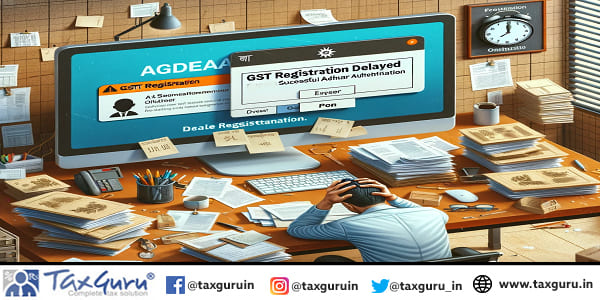In the realm of tax compliance, timely registration is crucial for taxpayers. However, despite successful Aadhaar authentication, some individuals encounter delays in the registration process. This article delves into the intricacies of such delays, as per Rule 8 and Rule 9 of the Central Goods and Services Tax (CGST) Rules, 2017.
Detailed Analysis
Rule 9 of the CGST Rules, 2017, outlines the procedures for verification and approval of registration applications. It specifies that if a person undergoes Aadhaar authentication as per sub-rule (4A) of Rule 8, but is flagged for detailed verification based on risk profile, the application will be processed within thirty days of submission.
Despite Aadhaar authentication, certain taxpayers may fall under the purview of Rule 9(aa), triggering the need for additional scrutiny. This could be due to various factors such as discrepancies in provided information or risk indicators identified by the common portal.
The delayed processing can lead to frustration among taxpayers, as prompt registration is essential for business operations and compliance. However, it’s crucial to understand that detailed verification is aimed at ensuring the integrity of the registration process and preventing misuse of benefits.
Furthermore, the communication from the GSTN (Goods and Services Tax Network) team assures taxpayers that necessary changes will be reflected in the online tracking module. This transparency is essential for maintaining trust and providing clarity to stakeholders throughout the registration journey.

Conclusion
In conclusion, instances of delay in registration despite successful Aadhaar authentication highlight the importance of a robust verification mechanism under Rule 9 of the CGST Rules, 2017. While delays may inconvenience taxpayers, they signify the system’s commitment to thorough scrutiny and compliance integrity.
Moving forward, stakeholders should remain vigilant about providing accurate information and understanding the implications of risk-based verification. By fostering collaboration between taxpayers and regulatory authorities, the registration process can be streamlined while upholding the principles of transparency and compliance.
This article provides a comprehensive overview of delays in registration despite successful Aadhaar authentication, offering insights into the regulatory framework and implications for taxpayers.
*****
Goods and services tax
Subject: Instances of Delay in registration reported by some Taxpayers despite successful Aadhar Authentication in accordance with Rule 8 and 9 CGST, Rules, 2017-reg
28/02/2024
Dear Taxpayers,
In accordance with Rule 9 of the Central Goods and Services Tax (CGST) Rules, 2017, pertaining to the verification and approval of registration applications, following is informed:
Where a person has undergone Aadhaar authentication as per sub-rule (4A) of rule 8 but has been identified in terms of Rule 9(aa) by the common portal for detailed verification based on risk profile, your application for registration would be processed within thirty days of application submission.
Necessary changes would also be made to reflect the same in the online tracking module vis-à-vis processing of registration application.
Thank you for attention.
Thanking you,
Team GSTN




